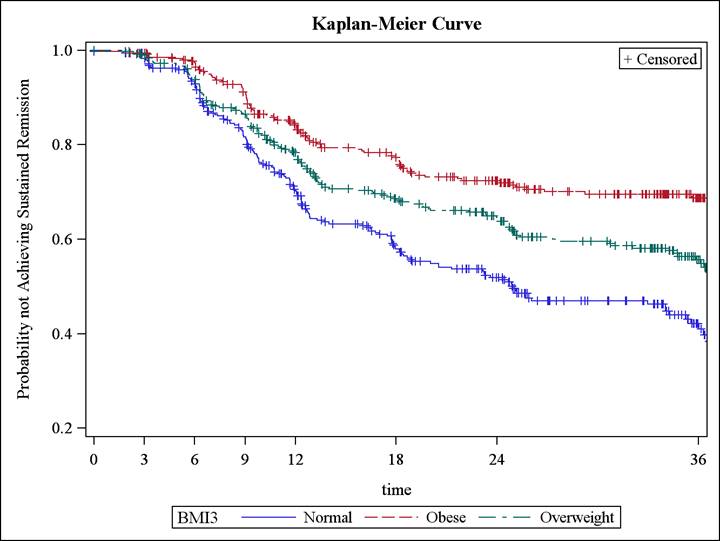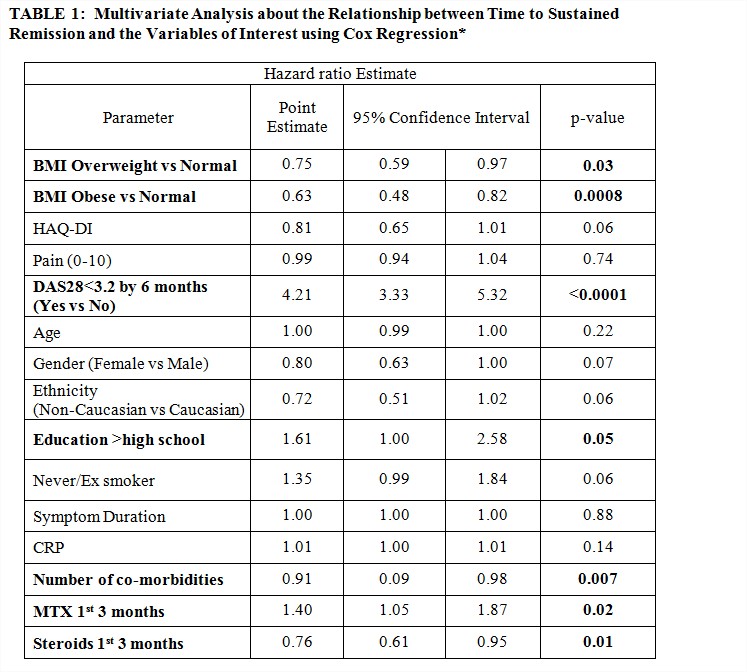Session Information
Session Type: ACR Concurrent Abstract Session
Session Time: 4:30PM-6:00PM
Background/Purpose:
High BMI has
been associated with worse disease severity and lower rates of sustained
remission (susREM) in early rheumatoid arthritis (ERA). In this study, we examined
the relationship of increased BMI on time to susREM in patients with ERA.
Methods:
Patients from
the multicenter, prospective cohort study, CATCH (Canadian Early Arthritis
Cohort) were analyzed. Patients with ERA (symptoms ≤12-months and
fulfilling American College of Rheumatology 1987 and/or 2010 RA criteria),
available BMI data, and at least 2 consecutive DAS-28 measurements met
inclusion criteria. Underweight patients (BMI ≤18.5) were excluded due
to small sample size (n=24). Patients were stratified into 3 BMI groups:
normal (18.5-24.9), overweight (25-29.9), and obese (≥30), and time to
sustained remission (time from 1st visit to DAS28≤2.6 at two
consecutive visits) was assessed. A Kaplan Meier survival plot was generated
along with the log-rank test to compare the time to susREM among the three BMI
groups. Cox proportional hazard regression was performed to quantify the
relationship between BMI groups and the hazard ratio for achieving susREM,
after adjusting for statistically significant variables from univariate
analysis and other identified potential confounders.
Results:
Of 1066/2626
patients with available BMI, 348 (33%) had a normal BMI, 369 (35%) were overweight,
and 348 (33%) were obese. Both Kaplan Meier curves (Figure 1) and log-rank
test (p<0.001) showed the difference in the survival functions among the 3
BMI groups. The difference remained significant in the multivariate cox
regression analysis. Specifically, patients in obese and overweight groups were
less likely to achieve susREM quickly compared to those with normal BMI
(HR=0.63, p=0.0008 and HR=0.75, p=0.03 respectively). Additionally, achieving
DAS28≤3.2 by 6 months (HR 4.209, p<0.01), higher education (1.608,
p=0.05), and use of methotrexate in the1st 3 months (1.401, p=0.02)
were more likely to achieve susREM, while
higher BMI, number of comorbidities (0.911, p<0.01), and use of steroids in
1st 3 months (0.761, p=0.01) were less likely to achieve susREM.
Conclusion:
Overweight and
obesity impact time and ability to achieve sustained remission. In addition to
lower rates, patients with high BMI take longer to achieve sustained remission
in ERA. Early methotrexate use is associated with shortened time whereas early steroid
use is associated with prolonged time to sustained remission, independent of
BMI. These findings support a growing body of evidence to include weight
management interventions in ERA treatment plans.
FIGURE
1:
To cite this abstract in AMA style:
Schulman E, Andersen K, Zhang M, Goodman SM, Lin D, Boire G, Haraoui B, Hitchon C, Jamal S, Keystone EC, Pope JE, Tin D, Thorne C, Bykerk V. High Body Mass Index Negatively Impacts Time to Achieving Sustained Remission in Early Rheumatoid Arthritis: Results from a Multicenter Early Arthritis Cohort Study [abstract]. Arthritis Rheumatol. 2015; 67 (suppl 10). https://acrabstracts.org/abstract/high-body-mass-index-negatively-impacts-time-to-achieving-sustained-remission-in-early-rheumatoid-arthritis-results-from-a-multicenter-early-arthritis-cohort-study/. Accessed .« Back to 2015 ACR/ARHP Annual Meeting
ACR Meeting Abstracts - https://acrabstracts.org/abstract/high-body-mass-index-negatively-impacts-time-to-achieving-sustained-remission-in-early-rheumatoid-arthritis-results-from-a-multicenter-early-arthritis-cohort-study/


